Rashid Mhango, a community worker in Kitwe’s Chimwemwe township, passionately discusses the significance of media and digital rights in Zambia, emphasizing their role in community welfare and empowerment.
Mhango, who serves as the Chimwemwe Ward Community Assistant, obliged Zambia Monitor an interview and delves into the country’s human rights environment, sharing his thoughts on freedom of expression, and how it is fostering democratic engagement, especially within the community.
In his mid-60s, Mhango acknowledged the positive impact of public media, particularly in the dissemination of impartial information.
Asked about media freedom and freedom of expression, Mhango said in an interview in Kitwe on Wednesday that Zambians had been freely exercising their right to speak out without intimidation, but also emphasized the importance of citizens adhering to the law when expressing their views.
“With freedom of expression, a person is given a chance to speak freely without any intimidation. So, when a person is giving out information, you must be free to say what you want to say but you have to follow the guidelines of what to say and what not to say,” Mhango said.
Read more: Political analyst claims ATI bill meant to hoodwink international community
He added: “We should not be using vulgar language when giving this type of information but ensure that everything that you say when asked a question is exactly said without adding other things that were not there. There should be no intimidation afterwards.”
Mhango reiterated the importance of prioritizing public interest when expressing views, emphasizing that utterances should benefit the nation.
“In a situation whereby you find that people are being intimidated…So if we want to give out any information regarding whatever….which is good for the country you have to be free to express yourself and ensure what you say what benefits the entire nation,” Mhango said.
He cautioned against making statements that tarnish the government’s reputation and encouraged use of words that contribute to nation-building.
Mhango also noted that though public media are sometimes perceived as biased, he observed their reporting to be professional.
“To me there certain media platforms that are doing well ZNBC, Times of Zambia and Zambia Daily are good media platforms because, if you are not happy, you can approach them to put the message in correct perspective,” Mhango stated.
Responding to Zambia Monitor on how cyber security act was impacting on digital rights, Mhango said he was worried about the abusive language those hiding behind the keyboards spill.
He expressed concern about the abusive language used by individuals who remain anonymous online, highlighting how some users hide behind keyboards to exercise their digital rights while concealing their identities.
He charged users of the cyberspace not to fear revealing their identities but should instead be accountable for their online actions.
“In most cases there are people who try to hide their identity it’ is important you capture the face of the person that is giving you that information,” Mhango said.
When asked if the current law was enough to protect journalists and media owners, Mhango admitted to not having knowledge on whether the current law was sufficient to protect journalists and media owners.
WARNING! All rights reserved. This material, and other digital content on this website, may not be reproduced, published, broadcast, rewritten or redistributed in whole or in part without prior express permission from ZAMBIA MONITOR.












Comments